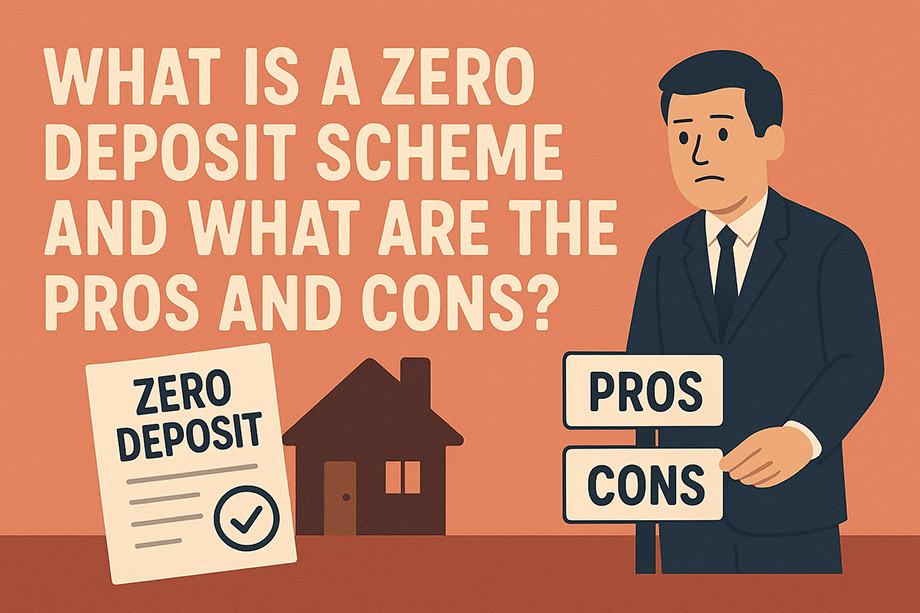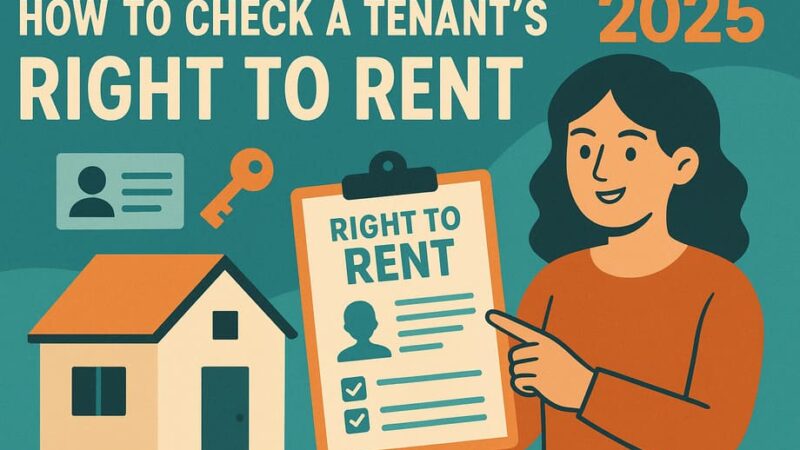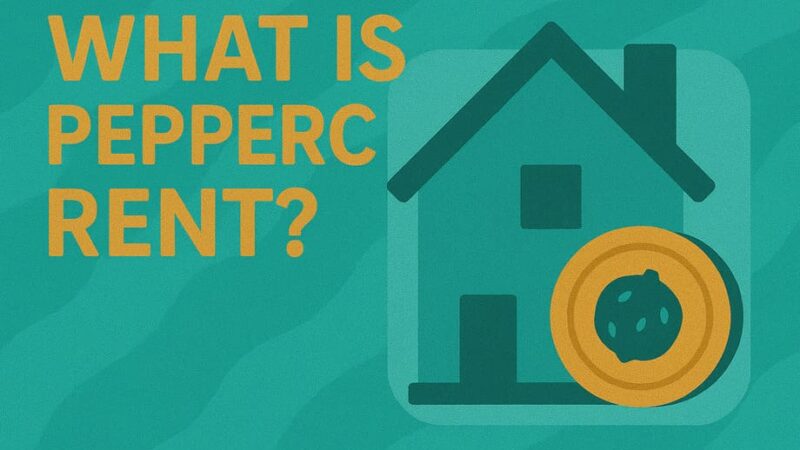What is a Zero Deposit Scheme and What Are the Pros and Cons?

It can be expensive paying a deposit for a new rental property, but there are alternatives available, such as a zero deposit scheme. We explain how these schemes work and what you need to consider.
Having to find a large deposit to rent a new property can be a significant barrier for many people. Landlords are required to protect this money, usually equivalent to five weeks’ rent, but zero deposit schemes offer an alternative option for tenants.
Here’s what you need to know about zero deposit schemes and whether they might be right for you.
What is a zero deposit scheme?
Normally, when tenants move into a privately rented property, they must pay a deposit to the landlord. This will be returned when they move out if the property remains in the same condition. If there is any damage, the landlord can take funds from the deposit for repairs.
Following the Tenant Fees Act in 2019, the deposit amount is capped at five weeks’ rent for properties where the total annual rent is less than £50,000, or six weeks’ rent if the total annual rent exceeds this amount.
The landlord needs to keep the deposit in a protected tenancy deposit scheme while the tenant lives in the property.
The deposit represents a lot of money for tenants to provide upfront on top of the first month’s rent. So, zero deposit schemes were set up to give renters an alternative option.
Zero deposit schemes, also known as no deposit schemes, allow renters to pay less money upfront and instead enter an insurance agreement with their private landlord. The terms of the agreement make the tenant liable for the cash equivalent of between six and 12 weeks’ rent.
The landlord can claim for any damage to the property, and the scheme will pay them and then bill the tenant.
How does a zero deposit scheme work?
If you’re considering a zero deposit scheme, your estate agent must be registered with a scheme to proceed. They’ll also need to ensure the landlord is happy to use a zero deposit scheme.
Here’s the typical process:
- Application: You apply through your estate agent or directly with the scheme provider
- Referencing: The provider checks your details, including your ability to afford the scheme
- Payment: You pay an initial fee (typically one week’s rent) plus setup costs
- Agreement: You enter into an insurance agreement that covers the landlord
- Tenancy: You move into the property without paying a traditional deposit
At the end of the tenancy, the landlord can raise a claim for any damage to the property. The scheme will pay the landlord and then bill the tenants, which they can dispute.
If the tenants don’t pay straight away, no deposit schemes can use a debt collection agency to recover money from tenants, which can affect their credit rating.
So, while tenants will avoid an expensive deposit initially, they could potentially face a hefty bill when they move out.
Do you have to pay any fees?
Yes, while the initial costs are lower than a traditional tenancy deposit, tenants still pay fees.
Typical costs include:
- Initial payment equivalent to one week’s rent
- Setup fee (usually around £60)
- Annual membership fee (typically £17.50 per year)
- Potential dispute fees if you challenge a landlord’s claim
There are no fees for the landlord, and using a no deposit scheme can mean less admin for them, as they don’t need to set up a tenancy deposit protection scheme.
But it’s vital to understand that with no deposit schemes, even if the landlord makes no claims, tenants will not get any of the money they’ve paid back. This is fundamentally different from a traditional deposit, which is returned if there’s no damage.
Can anyone qualify for a zero deposit scheme?
To apply for a zero deposit scheme, the first thing a tenant needs to do is speak to their estate agent.
Before a tenant can join a scheme, they’ll need to go through referencing, where the provider checks details about the tenant, including:
- Credit history
- Employment status and income
- Previous rental history
- Whether they can afford the scheme’s ongoing costs
If a tenant doesn’t pass referencing, they can ask someone to be their guarantor, who will be liable to make any payments the tenant owes if they don’t pay them. Guarantors will also have to pass the provider’s referencing checks.
What protection do tenants have?
There have been some concerns raised by housing professionals about zero deposit schemes. The Competition and Markets Authority (CMA) has investigated concerns about whether tenants using no deposit schemes understand their liabilities, as well as about how some letting agents sell these schemes.
Important protections include:
- FCA regulation for some providers
- Use of independent dispute resolution services
- Clear terms and conditions explaining your liabilities
- Right to challenge unfair claims
If you’re a tenant thinking about using a zero deposit scheme, make sure you read the agreement carefully and understand what you may have to pay.
What are the pros and cons of zero deposit schemes?
There are many benefits and drawbacks to zero deposit schemes, but remember to check your agreement as terms can differ between providers.
The pros of zero deposit schemes
For tenants:
Lower upfront costs: The upfront costs for zero deposit schemes are much lower than a typical tenancy deposit. Instead of potentially thousands of pounds, you might only pay a few hundred.
Faster moving: You can move into a new property more quickly without having to save up for a large deposit or wait for a previous deposit to be returned.
Cash flow: Your money isn’t tied up in a deposit for the duration of your tenancy, giving you more flexibility with your finances.
No deposit disputes: You won’t face the common problem of landlords trying to keep part of your deposit unfairly.
For landlords:
Less admin: A zero deposit scheme can mean less administration for landlords, potentially speeding up the letting process.
Wider tenant pool: More tenants can afford to rent, reducing void periods.
Better protection: Some schemes offer protection equivalent to 6-12 weeks’ rent, compared to the maximum 5-6 weeks for traditional deposits.
Quick payments: If claims are approved, landlords typically receive payment within days rather than weeks.
The cons of zero deposit schemes
For tenants:
No money back: Tenants won’t get the money they pay into the zero deposit scheme back, even if they leave the property in perfect condition.
Potential large bills: If the landlord raises a claim about damage when tenants move out, they will need cash to pay potentially substantial amounts.
Higher long-term costs: Over time, you may pay more than you would with a traditional deposit, especially if you stay in the property for several years.
Credit risk: Failure to pay claims can affect your credit rating and result in debt collection activity.
Dispute fees: Some providers charge fees for raising disputes against landlord claims.
For landlords:
Administrative complexity: While some admin is reduced, dealing with insurance claims can be more complex than traditional deposit procedures.
Timing: There may be delays in receiving payments compared to simply deducting from a held deposit.
Tenant behavior: Some tenants may be less careful with the property knowing they haven’t paid a large upfront deposit.
How do you settle disputes?
Before you enter a zero deposit scheme, it’s important to check their dispute policy.
Key questions to ask:
- Who handles disputes (independent service or the provider)?
- What evidence is required to support or challenge claims?
- Are there fees for raising disputes?
- How long does the process take?
- What happens if you disagree with the decision?
Some providers use The Dispute Service (TDS) or similar independent arbitration services, which is generally considered fairer than schemes that judge their own disputes.
Some providers may charge tenants a fee for raising a dispute against a landlord’s claim, which can be stressful to deal with and expensive.
Alternative options to consider
Before committing to a zero deposit scheme, consider these alternatives:
Deposit loans: Some organizations offer interest-free loans to help with rental deposits.
Rent guarantee insurance: Some insurers offer products that can replace traditional deposits.
Gradual deposit schemes: Some landlords may accept deposits paid in installments.
Family assistance: Borrowing from family members might be cheaper than ongoing scheme fees.
Savings plans: Building up savings specifically for rental deposits.
Is a zero deposit scheme right for you?
Zero deposit schemes can be helpful in certain circumstances, but they’re not suitable for everyone.
They might be right for you if:
- You’re struggling to save for a large deposit
- You need to move quickly
- You’re confident in your ability to maintain the property well
- You understand and accept the ongoing costs
- You have good credit and stable income
They might not be suitable if:
- You’re planning a long-term tenancy (costs may exceed traditional deposit)
- You’re concerned about potential damage liability
- You prefer to have money returned if no damage occurs
- You want maximum protection in disputes
Key takeaways
Zero deposit schemes offer a genuine alternative to traditional rental deposits, making moving home more accessible for many tenants. However, they fundamentally change the relationship between tenant and landlord, shifting from a refundable security deposit to a non-refundable insurance product.
Before signing up:
- Read all terms and conditions carefully
- Understand your liability for damage and unpaid rent
- Check the dispute resolution process
- Calculate the total cost over your intended tenancy length
- Ensure the scheme is properly regulated
Remember:
- You’re still liable for any damage or unpaid rent
- The money you pay is not refundable
- Claims can be pursued through debt collection if unpaid
- Your credit rating could be affected
While zero deposit schemes can be beneficial, they require careful consideration of your personal circumstances, financial situation, and rental plans. Make sure you fully understand what you’re signing up for before committing to any scheme.
Last Updated on July 31, 2025 by James Cartwright







